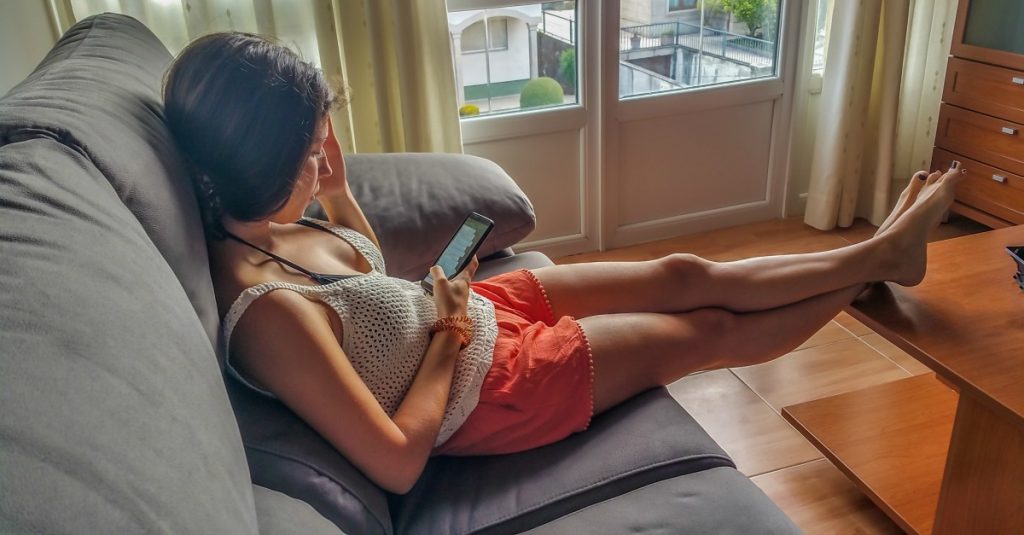
Like most parents of teens who were already struggling with setting a good example for screentime, the pandemic made it so much worse.
I mean, there were days when it was cold and rainy and no one wanted to play one more game. I also felt bad about all the things they missed and hoped that they were maintaining some sort of connection to the outside world.
Now that things are back to normal, I don’t want to spend all my time nagging. I hate spending the small amount of time I have with my teens telling them to get off their phones.
There is nothing worse about raising teens than the constant battle of the screen.
During the pandemic, I didn’t say a word when I walked past my teens sitting on the couch, faces in their phones hour after hour. There have been times I’ve let them play video games late into the night, or I’ve been pretty sure they’ve almost worn out Netflix. I didn’t check on them every time they were in their room for hours, even though I knew they were probably on some sort of device or making a TikTok or scrolling.
And now, as their high school life is busy and full, it’s still tough to get them off their phones when they feel like they have “nothing better to do.”
But this week, one of my normally “fairly” even-tempered teens has been over-the-top snarky and kinda mean. Another seems to come to tears at every turn. And my third seems suddenly withdrawn and depressed. When I talked to a few friends, I heard a similar theme. A lot of acting out, a lot more anxiety, a lot more tears.
I’ve been trying to talk to my kids more this week, diverting their attention from their phones, but honestly, it’s been tough. Their feelings are valid.
I don’t think there’s a person out there right now who doesn’t feel the heaviness of our world in one way or another. I think we are all worried and uptight and unnerved.
But I also can’t let things go on this way and watch them sink farther into the abyss of their phones. When the world seems dark, I don’t want them continuing down that lonely rabbit hole. I need them to come up for air and light. I need them to be able to identify when they need to check their behaviors and when we should be talking about their feelings.
More teens are starting to realize the damaging effects social media has on their self-esteem.
The facts are clear. Anxiety and depression are linked to the overuse of social media. It impacts teen’s sleep habits. And while the majority of parents believe they know what their child is posting on social media, according to a Pew Research poll, a survey of teens found that 70 percent of them are hiding their online behavior from their parents.
So, we had a family meeting and had to set new rules (see below), and I was a little surprised when one of my girls admitted she had a major problem putting her phone down. She had gone on Amazon and found a safe that would store her phone for a certain amount of time and wouldn’t let her access it until time was up. Another mentioned that there was nothing she wanted to do more than watch videos, so she didn’t have to think.
That’s a problem.
I’ve always felt I was more strict with technology than other parents, primarily because it’s my business. My job literally is to be on social media all day (and some nights) for my clients.
I know all the dangers, I made all the rules, I did all the monitoring.
But sometimes, we just miss what’s sitting right under our noses. And let’s be honest, raising teens is hard.
It’s never too late to change the tech rules in your home–for your kids and for yourself.
Yesterday we started a slow detox of phone and tech. We talked about active and passive tech usage (active being using your phone to help you cook or do a workout as opposed to passive for just scrolling.)
We turned off phone notifications so their screens wouldn’t constantly be flashing as a reminder that they might be missing something. And they can’t remain isolated in their bedrooms.
And I’ve got to walk the walk, too.
That might be the hardest part.
But we have to protect our kids’ mental health in these difficult times. We have to watch for signs. We have to stay active–even when, especially when, it’s hard.
Be aware of your kids’ behavior and when they change. Once you identify these, it gives you the power to help them address it, which is one of the most important lessons we can impart to our kids.
Just in case you need somewhere to start, here are a few of the rules we implemented:
– Set a 30-minute timer on social media usage and then require a break (you can set time limits in “screen time” under settings)
– No phones after 10 p.m. and don’t let them keep them in their rooms overnight (They can stay up later than 10, they just can’t be on screens)
– Turn off ALL notifications for social media and other apps
– Everyone had to pick one non-screen hobby to do a few times a week.
– One screen at a time (i.e., not watching a show while also scrolling TikTok)
– Regular check-ins to talk about what they’ve seen on social media or online.
– Try to schedule small outings to encourage them to be off their phones.
Don’t expect them to thank you for it now, but they’ll thank you for it later.
We love this timed lock box from Mindsight to help detach from phones, video games, etc.

When you are in the thick of raising teens and tweens, we recommend Loving Hard When They’re Hard to Love by Whitney Fleming. In Loving Hard When They’re Hard to Love, blogger Whitney Fleming shares her favorite essays about raising three teenagers in today’s chaotic world. Written from the perspective of a fellow parent, each story will leave you with tears in your eyes and hope in your heart because someone else is saying exactly what’s been going through your mind.

Parenting Teens and Tweens can be hard. These popular posts that other parents found helpful might help make it a little easier:
Here’s How To Make Sure Your Teens Have Fun And Are Productive This Summer
The Most Important Reason Teens Should Not Have Their Phones At Night
The Best Ways You Can Fight Teen Cell Phone Addiction
* This post contains affiliate links where we earn a small commission for sales made from our website.







[…] Our Teens Are Really Struggling With Social Media Right Now, Here Is How To Help […]